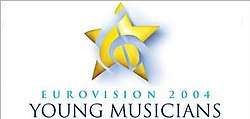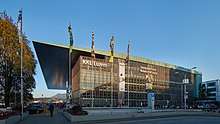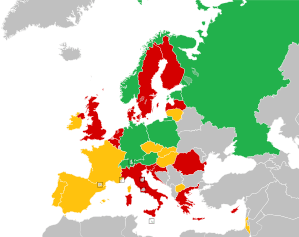Eurovision Young Musicians 2004
The Eurovision Young Musicians 2004 was the twelfth edition of the Eurovision Young Musicians, held at the Culture and Congress Centre in Lucerne, Switzerland on 27 May 2004.[1] Organised by the European Broadcasting Union (EBU) and host broadcaster Swiss Broadcasting Corporation (SRG SSR), musicians from seven countries participated in the televised final. Switzerland and broadcaster SRG SSR previously hosted the contest in 1984. A total of seventeen countries took part in the competition therefore a semi-final was held in the same venue on 22 and 23 May 2004. All participants performed a classical piece of their choice accompanied by the Lucerne Symphony Orchestra, conducted by Christian Arming.[1]
| Eurovision Young Musicians 2004 | |
|---|---|
 | |
| Dates | |
| Semi-final 1 | 22 May 2004 |
| Semi-final 2 | 23 May 2004 |
| Final | 27 May 2004 |
| Host | |
| Venue | Culture and Congress Centre, Lucerne, Switzerland |
| Presenter(s) | Christian Arming |
| Conductor | Christian Arming |
| Directed by | Mando Bernardinello |
| Executive producer |
|
| Host broadcaster | Swiss Broadcasting Corporation (SRG SSR) |
| Interval act | None (video about the week of the musicians in Lucerne) |
| Website | youngmusicians |
| Participants | |
| Number of entries | 17 (7 qualified) |
| Debuting countries | None |
| Returning countries | |
| Non-returning countries | |
Participation map
| |
| Vote | |
| Voting system | Jury chose their top 3 favourites by vote. |
| Winning musician | |
Czech Republic, Denmark, Italy and Latvia withdrew from the 2004 contest, whilst Belgium returned.[1] Albania was listed as the 18th participant, performing 9th at the first day of semi-finals, however in the end did not take part or broadcast the contest.[2]
Alexandra Soumm of Austria won the contest, with Germany and Russia placing second and third respectively.[3]
Location

Lucerne Culture and Congress Centre, was the host venue for the 2004 edition of the Eurovision Young Musicians.[1] It was built according to the plans of the architect Jean Nouvel and was inaugurated in 1998 with a concert by the Berlin Philharmonic Orchestra under the direction of Claudio Abbado.
Format
Christian Arming was the host of the 2004 contest. For the first time, the host and the conductor was the same person.[1]
Results
Preliminary round
A total of seventeen countries took part in the preliminary round of the 2004 contest, of which seven qualified to the televised grand final. The following countries failed to qualify.[1]
Final
Awards were given to the top three countries. The table below highlights these using gold, silver, and bronze. The placing results of the remaining participants is unknown and never made public by the European Broadcasting Union.[3]
| Draw | Country | Performer | Instrument | Piece | Result |
|---|---|---|---|---|---|
| 01 | Alexandra Soumm | Violin | Violin Concerto No.1 (1st Movement) by Niccolò Paganini | 1 | |
| 02 | Koryun Asatryan | Saxophone | Pequeña Czarda by Pedro Iturralde | 2 | |
| 03 | Dinara Nadzhafova (Klinton) | Piano | Piano Concerto No.2 (3rd Movement) by Camille Saint-Saëns | 3 | |
| 04 | Agnieszka Grzybowska | Percussion | Concerto for Marimba and Strings by Ney Rosauro | - | |
| 05 | Jaan Kapp | Piano | Piano Concerto No.2 (3rd Movement) by Sergei Rachmaninoff | - | |
| 06 | Giuliano Sommerhalder | Trumpet | Trumpet concerto No.2 (2nd and 3rd movement) by André Jolivet | - | |
| 07 | Vilde Frang Bjærke | Violin | Violin Concerto (3rd movement) by Jean Sibelius | - |
Jury members
The jury members consisted of the following:[1]



.svg.png)


.svg.png)
Broadcasting
The competition was transmitted live over the Eurovision Network by the participating broadcasters.[4] The Final was also broadcast by the Swiss radio channels and was also shown in Canada and Australia.[5]

.svg.png)
.svg.png)
.svg.png)

.svg.png)














References
- "Eurovision Young Musicians 2004: About the show". European Broadcasting Union. Retrieved 5 October 2014.
- http://www.srf.ch/medien/wp-content/uploads/chronik/upload/33_M_T_Halbfinal_Young_Musicians.pdf
- "Eurovision Young Musicians 2004: Participants". youngmusicians.tv. European Broadcasting Union. Retrieved 5 October 2014.
- "Eurovison Young Musicians". EBU. 26 May 2004. Archived from the original on 8 April 2005. Retrieved 4 May 2018.
- "EBU.CH :: 2004_05_28_EYM". EBU. 8 April 2005. Archived from the original on 8 April 2005. Retrieved 4 May 2018.
- "ZDF-Pressemitteilung / Koryun Asatryan deutscher Kandidat beim EBU-Wettbewerb für junge Musiker 2004 / ZDF entsendet 18-jährigen Saxophonisten zur Endausscheidung nach Luzern". Retrieved 4 May 2018.

